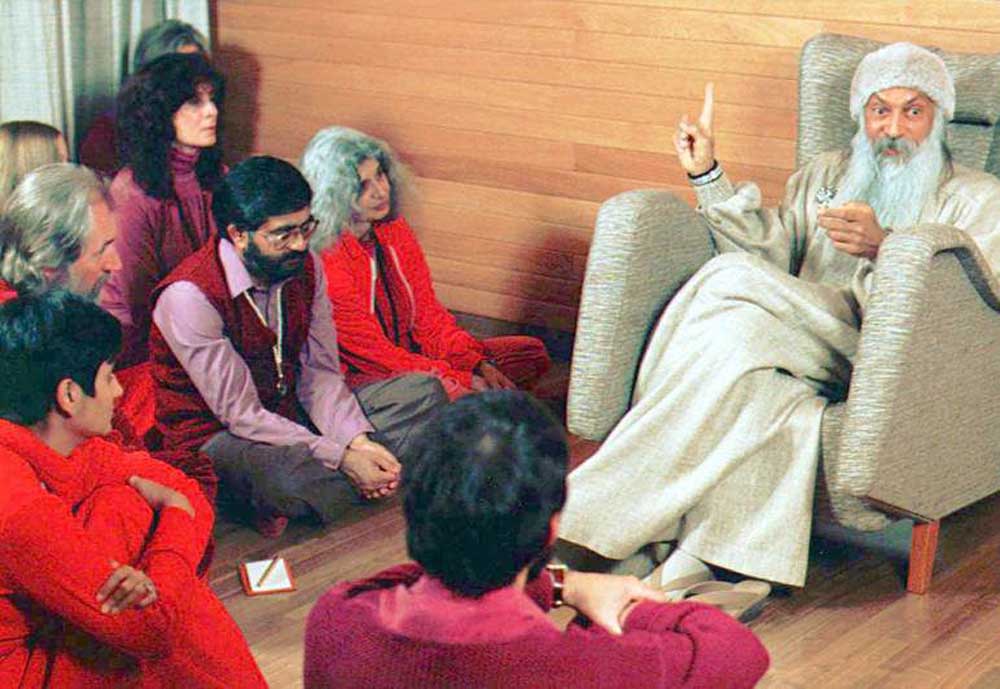Editorial: Oregon election law’s Rajneeshee hangover
Published 12:00 am Friday, March 23, 2018

- Bhagwan Shree Rajneesh addresses followers at his cult encampment near Antelope in the early 1980s. (Bulletin file photo)
Netflix’s six-part documentary has reacquainted millions of people with the Rajneesh cult, which transformed a Wasco County ranch into a controversial commune during the 1980s. This strange piece of Oregon history certainly makes for great TV, but it didn’t make for great election law. An unfortunate constitutional amendment inspired, in large part, by the Rajneeshees’ activities endures, creating a minor barrier to the ballot in a state that bends over backward to make voting as easy as possible.
Intending to sway local elections in 1984, the followers of Bhagwan Shree Rajneesh bused homeless people living outside of Oregon to Wasco County and tried to register them to vote.
Trending
Oregon law at the time allowed people to register on Election Day. The scheme failed, but it gave momentum to a 1986 initiative requiring people to register at least 20 calendar days before an election.
Oregonians supported Measure 13 that November by an overwhelming margin despite opposition from the American Civil Liberties Union of Oregon and other good-government groups, which argued that the amendment would erode Oregonians’ voting rights unnecessarily. Remember, the Rajneeshees’ voting scheme was a flop.
The Rajneeshees may be long gone, but the amendment is with us. As a result, Oregonians who want to vote in the May 15 primary must be registered by April 24. Oregon certainly is not unusual in cutting off registration this early, but the deadline is glaringly inconsistent with the state’s efforts to make voting and registration easy. Under the state’s “motor voter” law, for instance, Oregonians are registered to vote automatically whenever they visit the DMV to apply for or renew a driver’s license or other ID. The law even captures people as young as 16, although they won’t receive ballots until they become eligible to vote at 18.
In other important ways, voting in Oregon is a couch potato’s dream. Oregonians may update their registration — switching party affiliation, for instance — online with little effort.
And, of course, voting doesn’t require a trip to a polling place. It’s done by mail.
And so here we are. Oregon wants people to vote so badly that it registers them automatically and without their consent, even when they’re too young to cast a ballot. Yet, it won’t let them register within three weeks of an election. So why not ask voters to allow same-day registration, as a number of other states do?
Trending
The best argument for doing nothing is also, ironically, the best argument to change the Constitution. It’s the state’s motor-voter law, which, notes Deschutes County Clerk Nancy Blankenship, has reduced the number of unregistered voters in Oregon substantially. You could argue that the motor-voter effect renders the state’s 20-day cutoff less significant as a barrier to voting, and you wouldn’t be entirely wrong. Neither, however, would you be entirely right thanks to the way motor voter works.
The law registers Oregonians as nonaffiliated voters. Though they’re offered an opportunity later to change their affiliation — and also to become unregistered — many may not give the matter much thought until they receive their ballots in the mail. At that point, it might dawn on them that they would prefer to be registered as Democrats, Republicans and so on, giving them full participation in partisan primaries like the one coming up in May.
But if they want to switch at that point? Too bad. The very people Oregon registers automatically are denied an opportunity to choose an affiliation within almost three weeks of an election.
Allowing same-day registration might create hassles for county clerks given the state’s reliance on mail ballots. But Oregon’s election system has been evolving for years, and it would be odd to suggest that it can’t tolerate further change in the interest of voter participation.
Besides, clerks engage voters in various ways between the registration deadline and the conclusion of Election Day.
People who lose their ballots may request replacement ballots within 20 days of an election, for instance. And something very like same-day registration is an option for voters who find themselves on the inactive rolls, according to Blankenship. They may come to a clerk’s office and update their registration until 8 p.m. on Election Day.
Legislators should give Oregonians a chance to establish same-day voter registration.
Then again, they can sit back, do nothing and continue to give the Rajneeshees the last laugh.








